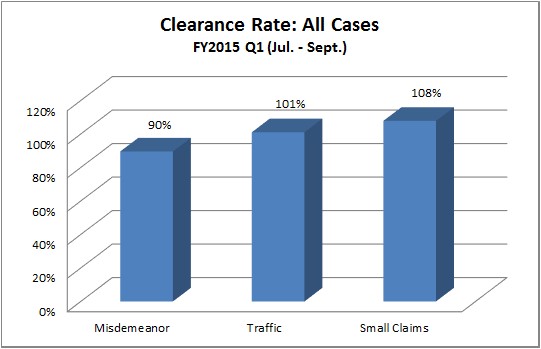With oversight from the State Courts, local Justice Courts share jurisdiction with the Juvenile Court in cases involving 16 and 17 year old minors who are charged with certain traffic offenses. The Juvenile Court handles automobile homicide, alcohol or drug related traffic offenses, reckless driving, fleeing an officer, and driving on a suspended license.
During the 2015 General Session, the Legislature appropriated for Fiscal Year 2016, $1,360,700 from all sources for Justice Courts. This is a 2.3 percent increase from Fiscal Year 2015 revised estimated amounts from all sources. The total includes $239,900 from the General/Education Funds, an increase of 3.5 percent from revised Fiscal Year 2015 estimates.
Below is the aggregate clearance rate for local justice courts. Currently, the clearance rate for all categories of cases processed in the justice courts is above 100% for the past four quarters. This is an improvement from recent years which show clearance rates below 100% prior to FY 2010.

Justice Courts are established by counties and municipalities and have the authority to deal with class B and C misdemeanors, violations of ordinances, small claims, and infractions committed within their territorial jurisdiction. Justice Courts hear the vast majority of cases in Utah, and fulfill the constitutional obligation of a court not of record. Justice Court territorial jurisdiction is determined by the boundaries of local government entities such as cities or counties, which hire the judges.
Justice Court judges are nominated by local nominating commissions, and selected by the local government entity. They serve six-year terms of office, and stand for retention elections. Judges in large jurisdictions may hear cases daily while others hold court once a month. Justice Court judges need not be attorneys, although they receive extensive and continuing legal training. All Justice Court judges must receive 30 hours of continuing judicial education each year to remain certified. There are 109 Justice Court judges serving in counties and cities throughout the state.
When requested, four-member juries hear cases in the Justice Courts. City attorneys prosecute cases involving municipal ordinance violations and state law in municipal courts; county attorneys prosecute cases involving violations of county ordinances and state law in the county courts. Litigants and defendants often act without an attorney (pro se) in Justice Courts.
Any person not satisfied with a judgment rendered in a Justice Court is entitled to a trial de novo (new trial) in the District Court. Any Justice Court judge may be appointed by the presiding District Court judge to conduct preliminary examinations and arraignments for felony cases under some circumstances. Justice Courts also have a Small Claims Department, which has jurisdiction over claims under $10,000.
Funding support for the Justice Courts is primarily for training of judges and reporting of case adjudication.
COBI contains unaudited data as presented to the Legislature by state agencies at the time of publication. For audited financial data see the State of Utah's Comprehensive Annual Financial Reports.